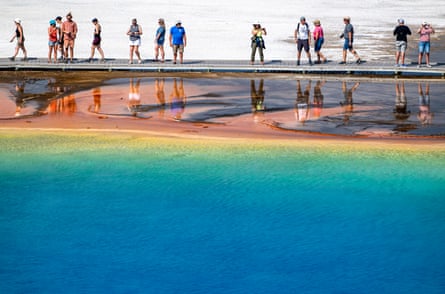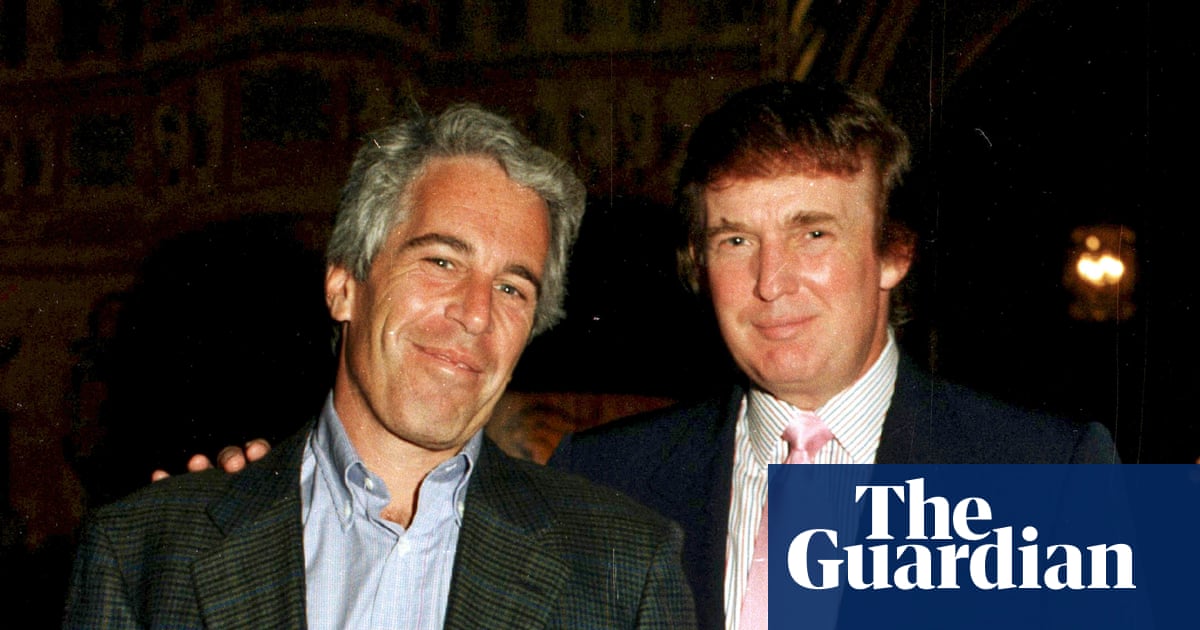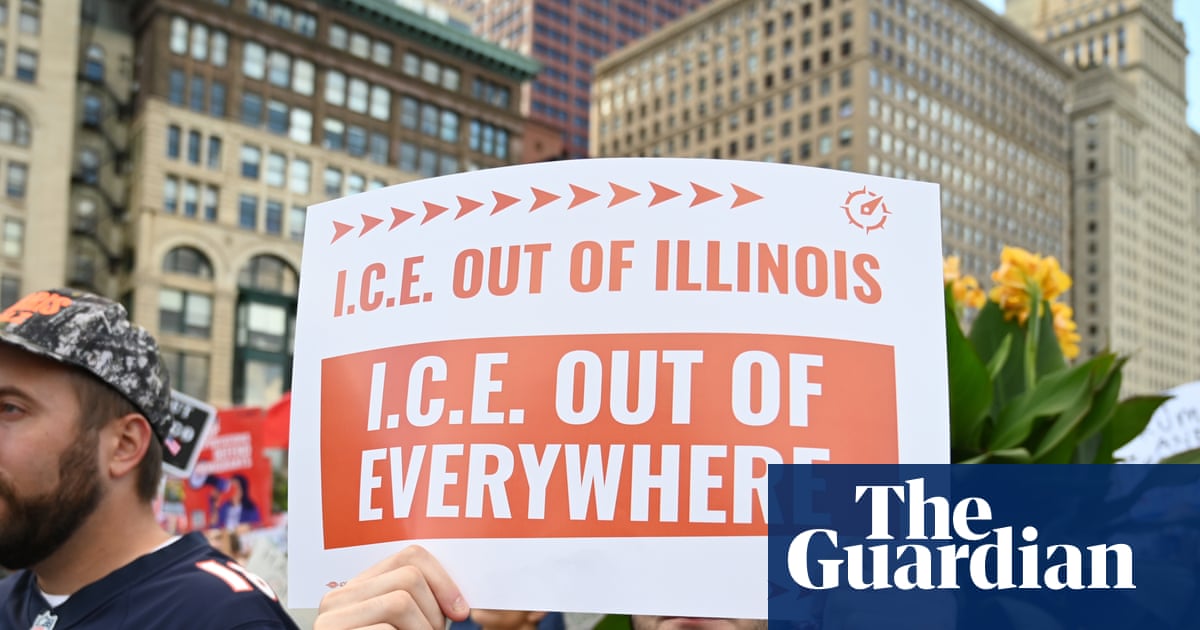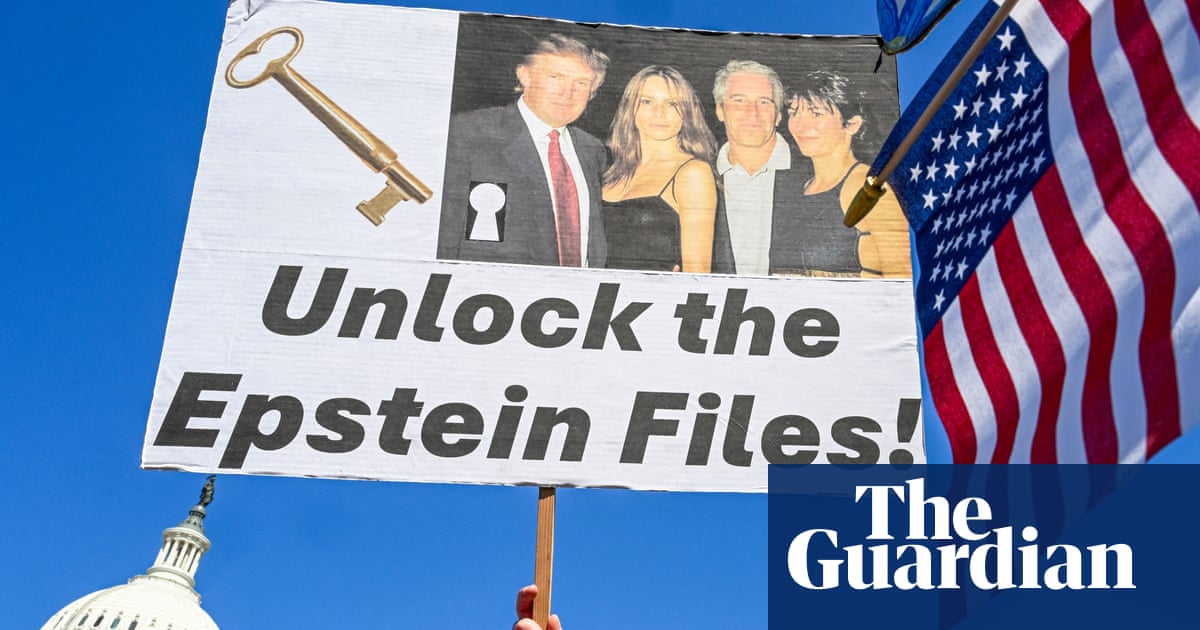As part of his administration’s war on “woke”, Donald Trump has asked the American public to report anything “negative” about Americans in US national parks. But the public has largely refused to support a world view without inconvenient historical facts, comments submitted from national parks and seen by the Guardian show.
Notices have been erected at every National Park Service (NPS) site, which spans 433 national parks, monuments and battlefields, following an order from May entitled “Restoring Truth and Sanity to American History”, issued by Trump’s department of the interior (DOI). The president had demanded a crackdown on any material that “inappropriately disparages Americans”.
The signs ask visitors to report any damage to parks as well as, via QR code, to identify “any signs or other information that are negative about either past or living Americans or that fail to emphasize the beauty, grandeur, and abundance of landscapes and other natural features”.
But a trove of nearly 500 comments relating to the signs submitted across the US by the public in June and July, seen by the Guardian, show that visitors have mostly been reluctant to demand the removal of park materials about the darker chapters of America’s past, such as slavery or the mistreatment of native tribes.
“Are we such weak, fragile people that we can’t view the full length and breadth of our history?,” one visitor to Muir Woods in California wrote in July after a sign called “history under construction” was taken down. “Are we so afraid that we have to hide factual history from the telling of our past? Oh, please!!”
Another visitor to Cumberland Gap national historical park in Kentucky wrote in June that “the staff that work at this park are among the kindest, most knowledgeable people you will find anywhere”. They added: “I hate that this administration feels that history that may depict the United States in a bad light should be covered up.”
Many of the comments praise park rangers or call for more information on issues such as the Indigenous American experience or the climate crisis. Some complain about the decision to remove the ‘T’ from LGBT at New York’s Stonewall national monument, to exclude transgender people, while some visitors demanded the unvarnished truth be told at Manzanar, a California facility where Japanese-Americans were interred during the second world war.
“Sanitizing or downplaying this history does a disservice to those who lived through it,” one Manzanar tourist wrote. “Whoever authorized this sign should be fired,” added another visitor about the new signage. “History belongs to all people, and any attempt to rewrite or gloss over even our darkest days should not be tolerated.”
The QR code comments, a snapshot of public opinions that are filtered before being stored by the NPS, come at a tumultuous time for the park service. Nearly a quarter of NPS staff have departed the agency since Trump became president, leading to overstretched and potentially dangerous conditions at storied sites often referred to as “America’s best idea”, such as Yellowstone, the Everglades and the Statue of Liberty.
“Americans have demonstrated they have a deep love affair with national parks and what we’ve seen from these comments is that the public has said this is an insulting and misguided effort,” said John Garder, a senior director at the National Parks Conservation Association.
“Rangers shouldn’t be intimidated to not talk about slavery and other things that have happened in America’s past. It’s outrageous and the American public have been deeply disturbed by it.”
However, not all of the submitted comments from what some park staff call “snitch signs” will be used to direct the revamp of park signage. Of the comments seen by the Guardian, fewer than 40 were ‘flagged for review’ by the park service and of those, fewer than 10 were indicated to be definitely used as part of the response to the interior department order.
This small selection of comments mostly aligns with the administration’s perspective. One complains about “revisionist history based in woke religion” at Muir Woods, another criticizes “fashionable leftist jargon” and a third, from a visitor to Washington’s Rock Creek park, is upset that materials on Francis Newlands, a US senator around the time of the first world war, “disparage him as a white supremacist for holding what were common views at the time”.

“They want this virtue-washed version of history and they are trying to drive a wedge between us and the public,” said one senior NPS employee, who did not want to be named for fear for retribution.
“Every time there is a comment asking for more information on Indigenous people, it won’t be acknowledged. If there’s someone who says they are terribly offended by a sign, it will be flagged and sent for review.”
The NPS staffer, part of the “resistance rangers” movement within the park service comprising more than 1,000 off-duty rangers that has its own podcast in which they contribute anonymously, said that the composition of comments has recently become more pro-Trump since the park service noticed the public were mostly supportive of signs.
“It seems like an orchestrated effort was made, a lot of the comments appear the same or AI generated,” said the employee. The Guardian has seen no evidence that the public responses have been distorted by the administration in this way.
“Overwhelmingly, we have a positive response from the public every day. People don’t want this. Every day I have people whisper to me ‘we love the parks, we want to help.’”
The administration is expected to act soon to take down signs it deems inappropriate. On Monday, it began a separate month-long process to review and remove other materials in national park sites, such as books and posters found in gift shops. “We have to review every single pamphlet, pin and magnet,” said one NPS employee. “There are going to be hundreds of items that are going to be removed.”
A superintendent of a history-based park said there has been very little guidance on how to judge materials as problematic. “It’s on the park staff, who are already under resourced, to figure out what to censor, which is really troubling,” they said.
“I’ve tried to not delegate any of this because I don’t want to make staff do things that go against their values,” the superintendent said of the signs.
“This is a way to stop us talking about difficult topics and tie our hands behind our backs. Overwhelmingly, the public aren’t buying it. They don’t want this. When the department set this up I don’t think they expected so many of the comments to be positive, it backfired a bit on them.”
The purge is part of a wider push by the Trump administration to bend American historical, cultural and scientific life to fit its ideological imperatives.
Military bases and statues will again bear the name of Confederate generals, climate science reports will be re-edited to potentially include discredited, fringe views while current and planned exhibitions at the Smithsonian Institution, the world’s largest museum and research complex, will be reviewed to “assess tone, historical framing and alignment with American ideals”.
An NPS spokesperson said by 18 September signs found to be “inconsistent” with the department of interior order will be removed, covered up or reinstated at a later date.
“The National Park Service has received several substantive comments to date from across the country complimenting park programs or services, noting maintenance issues, or flagging potential inaccuracies or distortions of information out of context,” the spokesperson said.
“In implementing the order, the goal is to foster honest, respectful storytelling that educates visitors while honoring the complexity of our nation’s shared journey and park staff are only sent actionable comments related to that goal.”

 German (DE)
German (DE)  English (US)
English (US)  Spanish (ES)
Spanish (ES)  French (FR)
French (FR)  Hindi (IN)
Hindi (IN)  Italian (IT)
Italian (IT)  Russian (RU)
Russian (RU)  3 weeks ago
3 weeks ago
























Comments